Transcriptional control of stem cell maintenance in the Drosophila intestine
- PMID: 20147375
- PMCID: PMC2827683
- DOI: 10.1242/dev.039404
Transcriptional control of stem cell maintenance in the Drosophila intestine
Abstract
Adult stem cells maintain tissue homeostasis by controlling the proper balance of stem cell self-renewal and differentiation. The adult midgut of Drosophila contains multipotent intestinal stem cells (ISCs) that self-renew and produce differentiated progeny. Control of ISC identity and maintenance is poorly understood. Here we find that transcriptional repression of Notch target genes by a Hairless-Suppressor of Hairless complex is required for ISC maintenance, and identify genes of the Enhancer of split complex [E(spl)-C] as the major targets of this repression. In addition, we find that the bHLH transcription factor Daughterless is essential to maintain ISC identity and that bHLH binding sites promote ISC-specific enhancer activity. We propose that Daughterless-dependent bHLH activity is important for the ISC fate and that E(spl)-C factors inhibit this activity to promote differentiation.
Figures
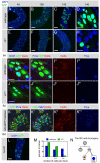
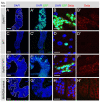
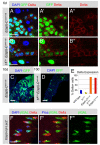
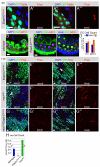
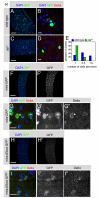
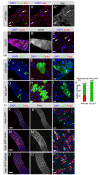

References
-
- Acar M., Jafar-Nejad H., Giagtzoglou N., Yallampalli S., David G., He Y., Delidakis C., Bellen H. J. (2006). Senseless physically interacts with proneural proteins and functions as a transcriptional co-activator. Development 133, 1979-1989 - PubMed
-
- Bailey A. M., Posakony J. W. (1995). Suppressor of hairless directly activates transcription of enhancer of split complex genes in response to Notch receptor activity. Genes Dev. 9, 2609-2622 - PubMed
-
- Bang A. G., Posakony J. W. (1992). The Drosophila gene Hairless encodes a novel basic protein that controls alternative cell fates in adult sensory organ development. Genes Dev. 6, 1752-1769 - PubMed
Publication types
MeSH terms
Substances
Grants and funding
LinkOut - more resources
Full Text Sources
Medical
Molecular Biology Databases

